This is not an analysis of themes in Phonogram: The Immaterial Girl.
Well, I mean, it IS, but not an even vaguely comprehensive analysis. Someone asked me what my primary interpretation of The Immaterial Girl is. As with any question that lets me talk about gaze and social structures in fiction, that was a dangerously tempting idea.
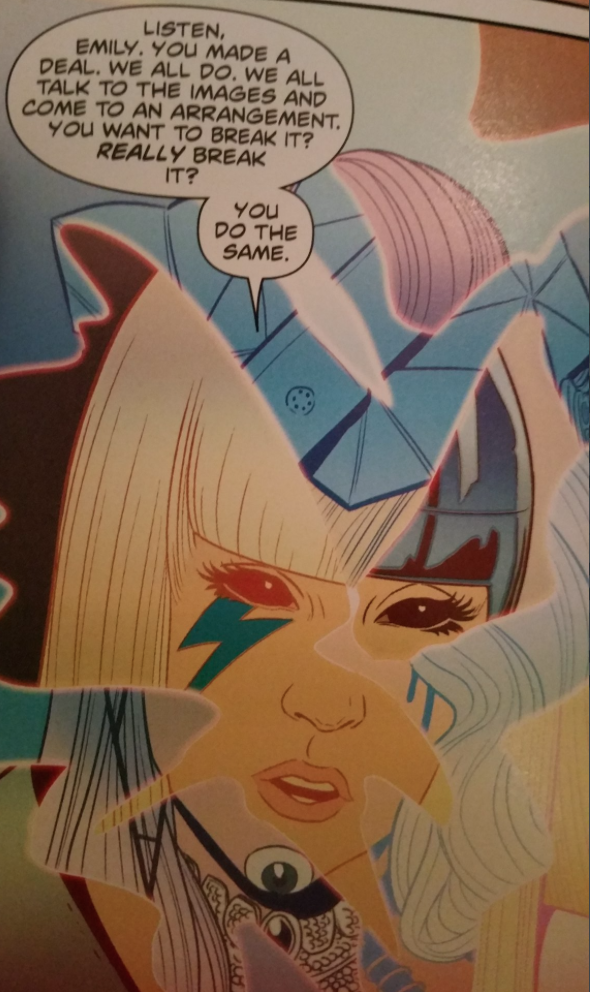
SO. Phonogram: The Immaterial Girl, like all Phonogram volumes, can be read on about 12,000 different levels, and is resistant to summation by design. I have many different readings of what vol. 3 is about. This is just the one, fairly surface-level read, and it deliberately only focuses on David and Emily. I wrote a little about another character’s relationship to gaze already, and if I tried to discuss them all my brain would melt, and none of us need a thesis paper on assumed gaze in Phonogram from the world’s least musical girl. This is more of a general nudge in the direction of my train of thought, for people wondering what it is.
Have I mentioned I don’t music well? At ALL? I don’t music. So this is my deliberately limited, incidentally unmusical, and intentionally non-cohesive thoughts on Phonogram: The Immaterial Girl, and a tiny portion of the interesting stuff it has to say. It probably has typos, but I’m tired, I’ll care tomorrow. (All images are badly photographed pages from Immaterial Girl, by Gillen, McKelvie, Wilson, and Cowles, which are much prettier digitally and/or on the page)
Emily

The core of Immaterial Girl is the deal Emily Astor made with the King Behind the Screen to be a powerful Phonomancer, aka cool, respected, and an influential voice.
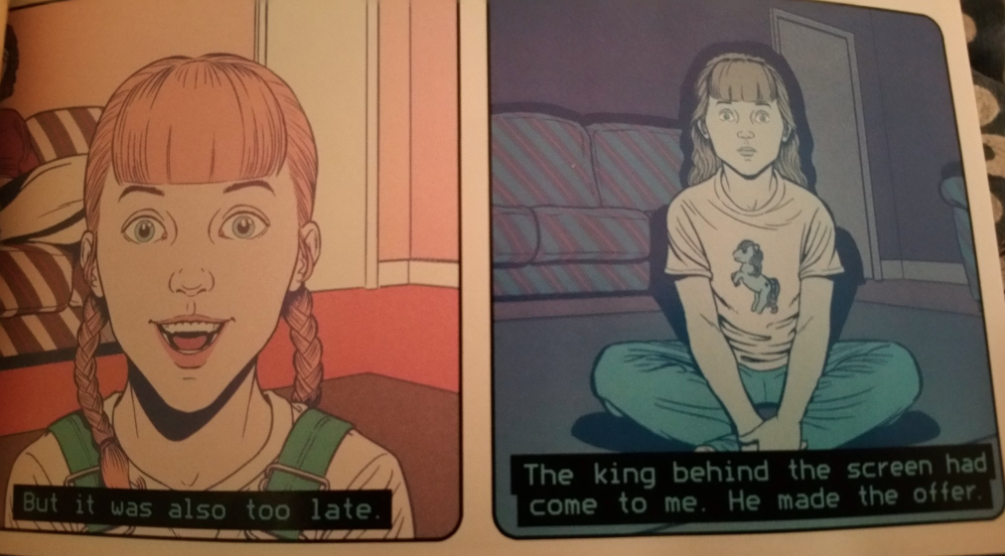
The King Behind the Screen is very much pop culture as embodied by television. Emily, like most of us, has filtered her whole life through the lens of the external male gaze that spoke to her through television as a young girl. She wasn’t immediately impacted by that exposure to the social pressures and expectations that MTV and its kin impose on women, but she absorbed enough that as a distraught teenager seeking a feeling of security and belonging in her social framework, she was seduced, as so many of us are.
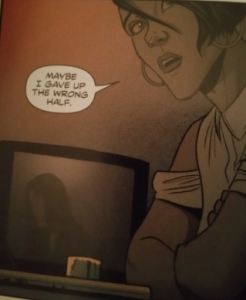
So she traded aspects of her personality for the ability to fit in and conform to the pop culture definition of the cool girl, loftily standing to the side rather than dancing, for fear of losing her aura of superiority. She leans into living that ‘ideal’ life of having everything pop culture taught her to want, and wanting nothing else that could tarnish her cool. By the time Emily became old enough to fully understand, question, and resent those external constraints on her identity, she was largely overwritten and self-programmed to be the socially acceptable Emily people expected to see, and therefore saw.
She came to hate the version of herself she had become that she sees her alternate self as a non-conformist life that could have been lived. She is so angry with herself over those choices she made as a youth that she swings to the opposite extreme, and seeks to destroy her chic, ‘respectable self’ by systematically violating social mores. Through this, the embracing of unfiltered honesty, goth chic, shagging the guy everyone thinks is a loser, and other behaviors that just generally make us as a cultural monolith uncomfortable, she sought to destroy herself as a statement against ‘the man’.
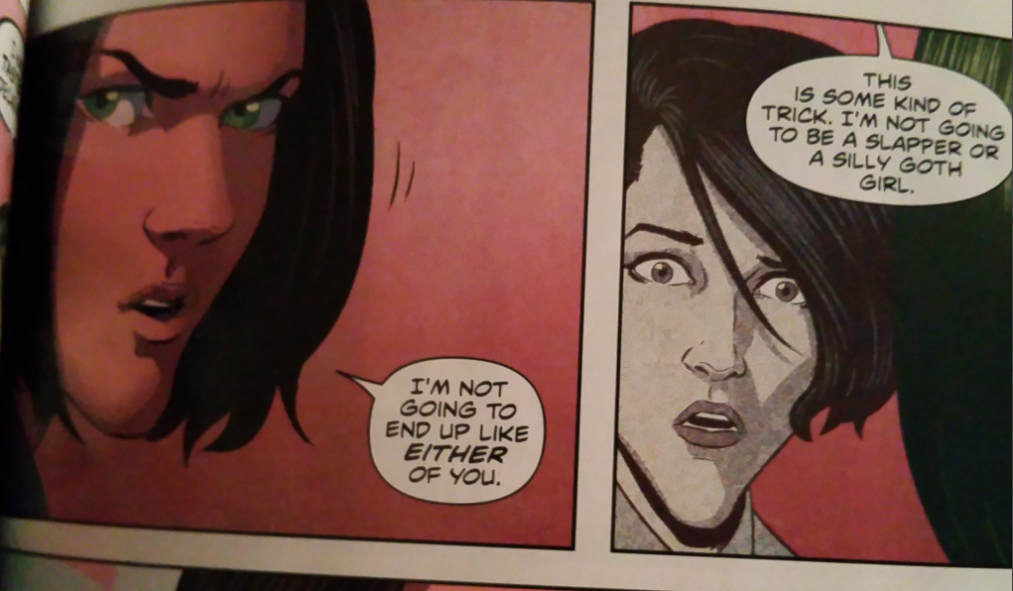
However, the socially enforced template she hated was not wholly external. There was no villainous King Behind the Screen, coloring Emily’s whole perception of reality and leading her to poor choices and self-harm; her own unquestioning assumption that the pressure to conform to the demands of pop culture’s external gaze could not be resisted, overthrown, or otherwise survived was the cause of her problems. The King Behind the Screen us, in fact, a Queen, an aspect Emily herself, holding herself to the standards and expectations she absorbed from pop culture as a girl.
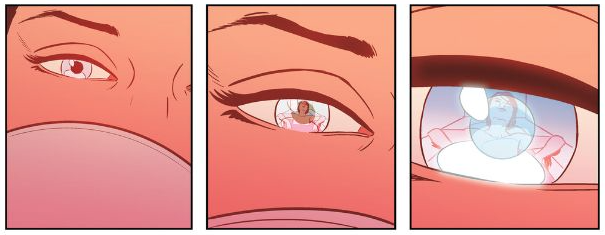
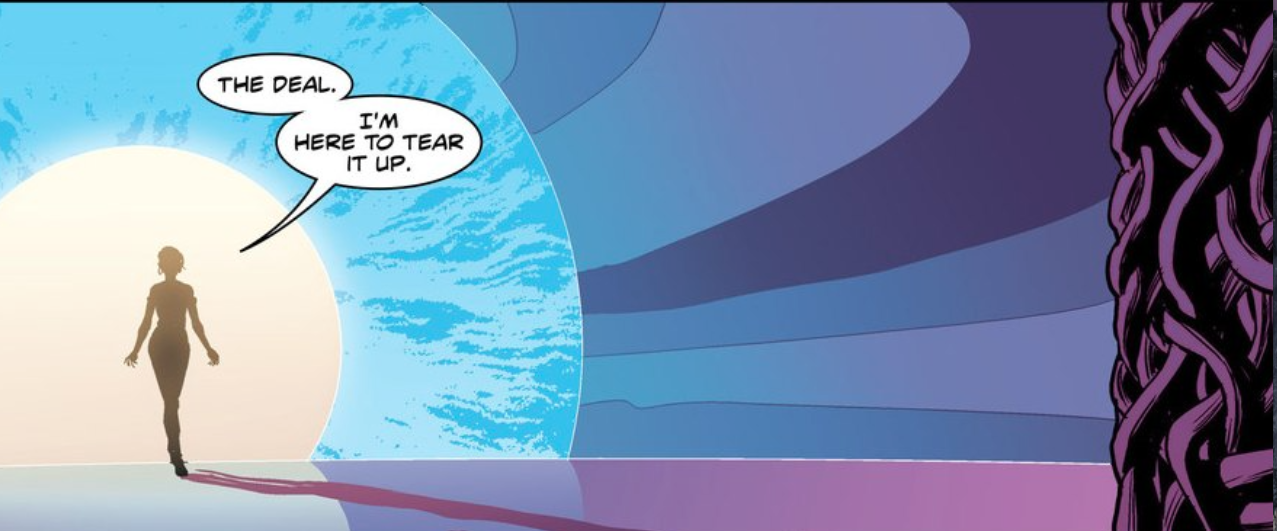
Emily’s journey in Immaterial Girl is that of recognizing that the she is not solely a victim of the toxic aspects of our culture, but a participant in perpetuating it, an active participant, with agency and the ability to make other choices, but constrained by her own fear that to resist the cultural tide would leave her with no identity at all. After finding her agency, Emily is left to pursue her own path independent of either of the labels she had been complicit in putting on herself, of the ideal girl or the outcast rebel.
David

David, meanwhile, is on the reverse journey, discovering that the influence he gained through the Rue Brittania arc gives him power over the way an individual sees the world, lets him broaden horizons and show people something new, but that it does not give him the power to save Emily from her social constraints and self-inflicted harm, because that person she made herself isn’t a foreign entity to be demonized or exorcized.
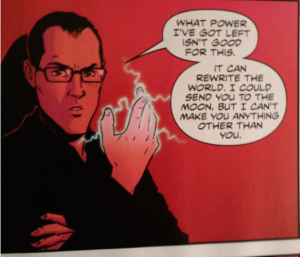
Emily isn’t a damsel who needs rescuing. She is part of the system of power David thrives in, and to change her situation the whole system must be changed. Which can be done, but not for her alone, and not merely for the sake of earning her gratitude or patting himself on the back. Instead of buying into the system and exploiting her, or trying to white knight her out of the culture and system of which he is a part, he uses his power to broaden Kid With Knife’s horizons.
That’s not super rewarding for David on an immediate gratification level. Being a creeper to the vulnerable Emily would have been, and his fantasies of swooping in and saving the day were as well. But in the end, one of his options was right and matters, and the other is superficial sellout nostalgia-bait of the kind David abhors above all else, so he reluctantly accepts his role as a supportive friend while surrendering the spotlight to Emily herself.
I could write roughly a million more paragraphs about David and how his arc addresses the way fame as a creator overwrites individual identity, the limitations and power of criticism, blah blah etc. and so forth, but I won’t, or I’ll be fiddling with this silly thing and getting self-conscious about it all night!
And that is one, doubtless MASSIVELY flawed, guaranteed to be incomplete 100% unmusical interpretation of Phonogram 3. I look forward to someone or other pointing me at whatever I’ve managed to get hugely wrong. 😉



